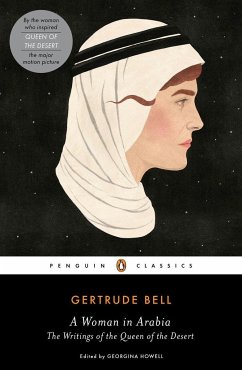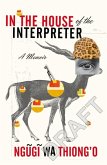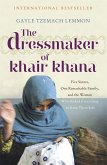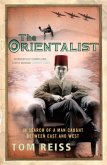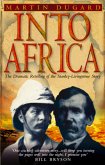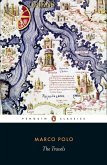During World War I, Georgina Howell worked her way up from spy to army major to become one of the most powerful woman in the British Empire. After the defeat of the Ottoman Empire, she was instrumental in drawing the borders that define the region today, including creating an independent Iraq. This book deals with her life and work.
Hinweis: Dieser Artikel kann nur an eine deutsche Lieferadresse ausgeliefert werden.
Hinweis: Dieser Artikel kann nur an eine deutsche Lieferadresse ausgeliefert werden.
A fascinating read . . . The story that emerges is thought-provoking. . . . Gertrude s legacy makes easy parallels to the present, from world powers trying to determine the political shape of the Middle East to women s struggles to be taken seriously by male colleagues. In A Woman in Arabia, she faces it all with humor, passion, and candor; even a century on, she s a woman worth knowing. NPR.org
[A] well-chosen selection from [the] letters and memoirs [of] one of the most remarkable figures of the late 19th and early 20th century . . . Bell might be regarded as the much happier, female equivalent of T. E. Lawrence, who knew and admired her. The Washington Post
I hope this collection of Bell s prose, more than the upcoming film by Werner Herzog, stirs up controversy about her time as an archaeologist and spy and spearhead of post-WWI British policy in the Middle East, the effects of which can still be felt today. Jonathan Sturgeon, Flavorwire s 10 Must-Read Books for August
Luckily for those of us who are unfamiliar with Gertrude Bell, there comes A Woman in Arabia . . . a collection of Bell in her own words, helpfully annotated. The Daily Beast
Bell s letters . . . are as rich in ethnographic detail as any of the great nineteenth-century European travelogues, but chattier devoid of the heroic rhetoric of T. E. Lawrence s Seven Pillars of Wisdom. . . . [They] capture both her charisma and the intensely social character of her time in the Middle East. Like the State Department cables released by WikiLeaks in recent years, Bell s archive of correspondence is a reminder of the daily disorder obscured by other political documents: maps, treaties, bulletins. The New Yorker
A fascinating glimpse at [Bell s] larger-than-life personality . . . Timely and timeless . . . The genius of this collection is letting Bell tell her story in her own words just as her fiercely independent spirit would have wanted. Impossible to put down, the book reads a bit like a travelog, part humorous wit and part educational lecture, allowing the reader an in-depth look at the life of a true heroine and the time period she inhabited and conquered. . . . A must-have for every library. Library Journal, starred review
An impressive anthology . . . Howell brings the female Lawrence of Arabia to life through judicious selections from Bell s massive public writings and personal papers. . . . Bell comes across as a compassionate, erudite quasi-diplomat worthy of great admiration. Kirkus Reviews
Tantalizing . . . Fascinating . . . Bell s own words showcase . . . a personality and intellect that glittered like the sun-drenched Arabian sands. . . . Readers will accompany her on some of her most daring exploits. . . . This is a nifty little volume that illuminates a remarkable life. Publishers Weekly
Her letters are exactly herself eager, interested, almost excited. . . . She kept an everlasting freshness; or at least, however tired she was, she could always get up enough interest to match that of anyone who came to see her. I don t think I ever met anyone more entirely civilized, in the sense of her width of intellectual sympathy. T. E. Lawrence
[A] well-chosen selection from [the] letters and memoirs [of] one of the most remarkable figures of the late 19th and early 20th century . . . Bell might be regarded as the much happier, female equivalent of T. E. Lawrence, who knew and admired her. The Washington Post
I hope this collection of Bell s prose, more than the upcoming film by Werner Herzog, stirs up controversy about her time as an archaeologist and spy and spearhead of post-WWI British policy in the Middle East, the effects of which can still be felt today. Jonathan Sturgeon, Flavorwire s 10 Must-Read Books for August
Luckily for those of us who are unfamiliar with Gertrude Bell, there comes A Woman in Arabia . . . a collection of Bell in her own words, helpfully annotated. The Daily Beast
Bell s letters . . . are as rich in ethnographic detail as any of the great nineteenth-century European travelogues, but chattier devoid of the heroic rhetoric of T. E. Lawrence s Seven Pillars of Wisdom. . . . [They] capture both her charisma and the intensely social character of her time in the Middle East. Like the State Department cables released by WikiLeaks in recent years, Bell s archive of correspondence is a reminder of the daily disorder obscured by other political documents: maps, treaties, bulletins. The New Yorker
A fascinating glimpse at [Bell s] larger-than-life personality . . . Timely and timeless . . . The genius of this collection is letting Bell tell her story in her own words just as her fiercely independent spirit would have wanted. Impossible to put down, the book reads a bit like a travelog, part humorous wit and part educational lecture, allowing the reader an in-depth look at the life of a true heroine and the time period she inhabited and conquered. . . . A must-have for every library. Library Journal, starred review
An impressive anthology . . . Howell brings the female Lawrence of Arabia to life through judicious selections from Bell s massive public writings and personal papers. . . . Bell comes across as a compassionate, erudite quasi-diplomat worthy of great admiration. Kirkus Reviews
Tantalizing . . . Fascinating . . . Bell s own words showcase . . . a personality and intellect that glittered like the sun-drenched Arabian sands. . . . Readers will accompany her on some of her most daring exploits. . . . This is a nifty little volume that illuminates a remarkable life. Publishers Weekly
Her letters are exactly herself eager, interested, almost excited. . . . She kept an everlasting freshness; or at least, however tired she was, she could always get up enough interest to match that of anyone who came to see her. I don t think I ever met anyone more entirely civilized, in the sense of her width of intellectual sympathy. T. E. Lawrence

